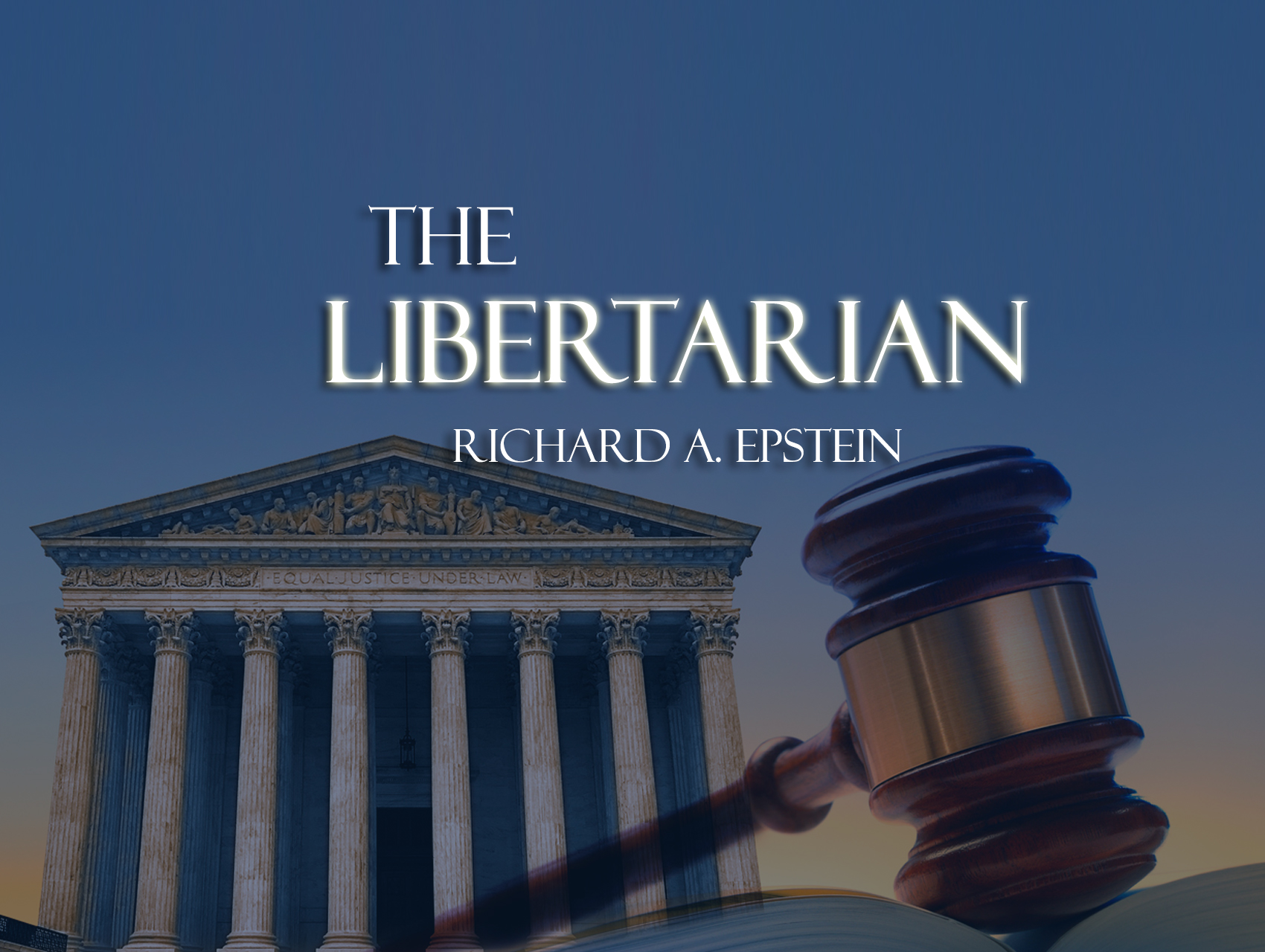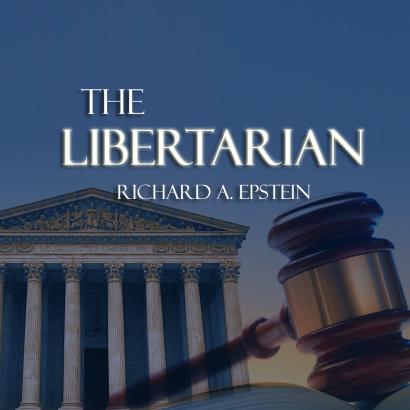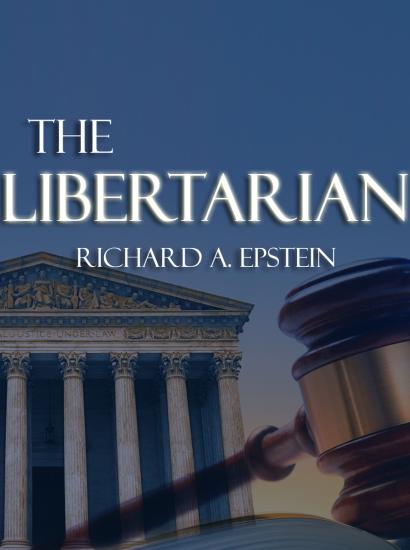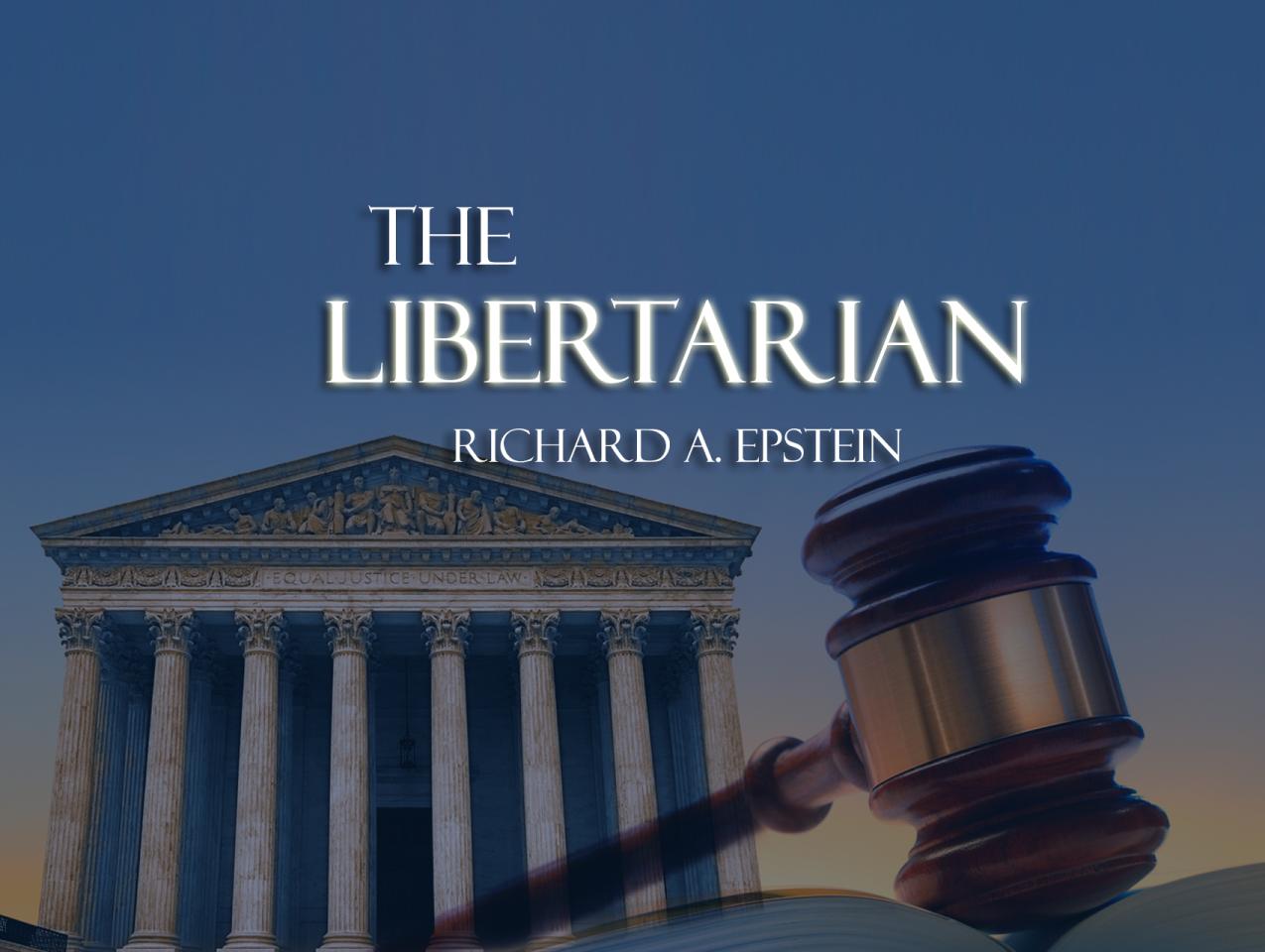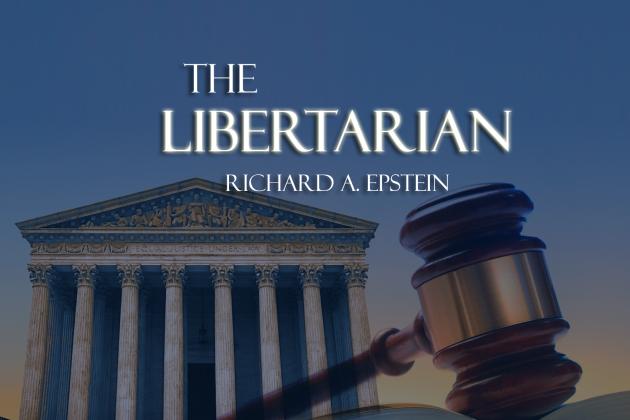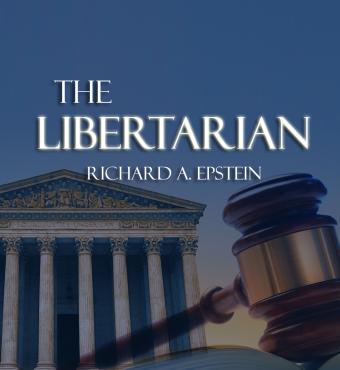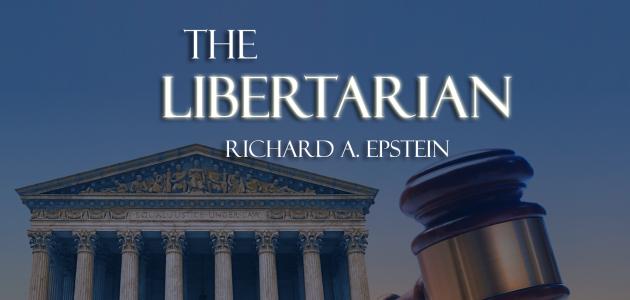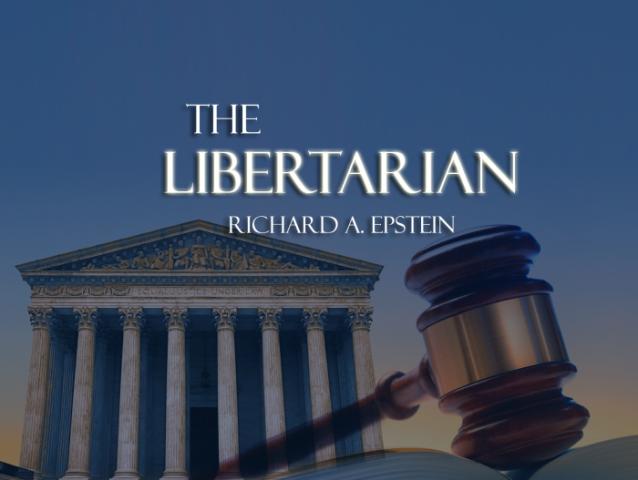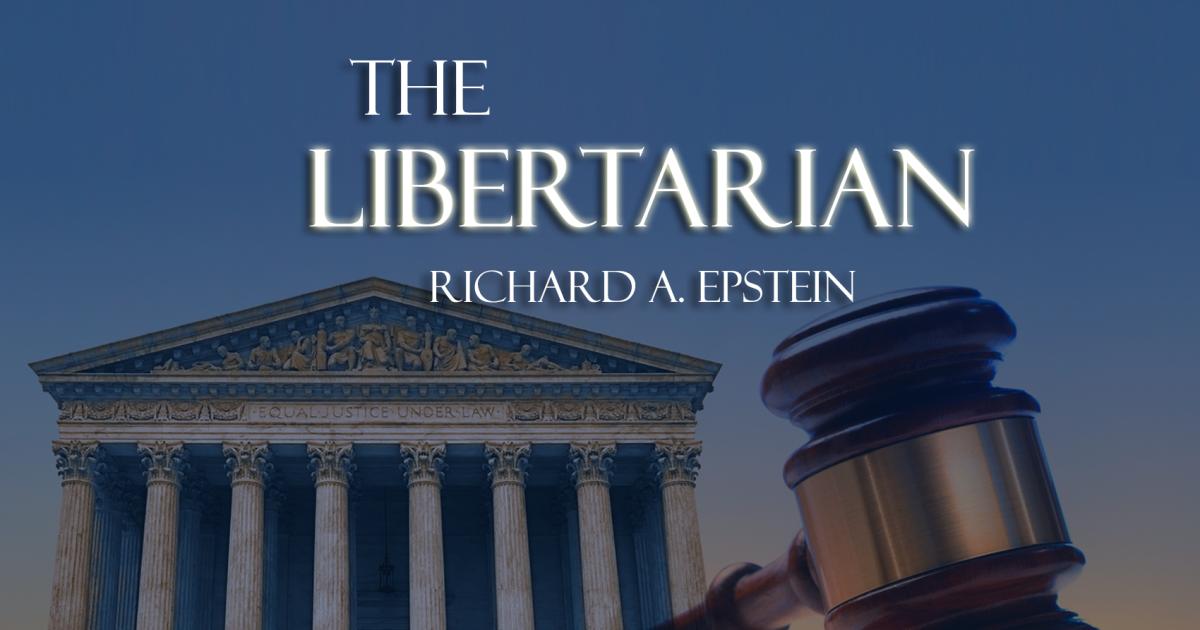Richard Epstein judges whether former President Trump’s January 6th trial should be fast-tracked to make sure it is not delayed until after the election, and weighs in the House GOP’s impeachment inquiry of President Biden.
>> Tom Church: This is the Libertarian Podcast from the Hoover Institution. I'm your host, Tom Church and I'm joined as always, by the Libertarian Professor Richard Epstein. Richard is the Peter and Kirsten Bedford senior fellow here at the Hoover Institution. He is the Lawrence A Tisch Professor of law at NYU.
And he's a senior lecturer at the University of Chicago. Now, Richard, we're rounding out the year here, talking former President Trump, some problems with, for President Biden and for his son, Hunter Biden. But we'll start with former President Trump, because special counsel Jack Smith recently revealed that his investigation into former President Trump's behavior on January 6 will use cell phone records from, from Trump when he was in office, along with another individual from the day of January 6.
This will ostensibly be used in this upcoming trial set to begin March 4th. Now, however, of course, set to begin March 4. Just on Monday, Smith filed a motion with the Supreme Court to bypass the normal appellate court process and fast track the Trump trial. Basically to make sure that this trial goes on instead of being delayed post post election.
Now, if it's not expedited, well, then, well, the likelihood is that President Trump, former President Trump will run for office. We will push everything out. And if he wins, he would be able to use the Justice Department to ostensibly shut down this investigation. So I'd love to know, Richard, should the Supreme Court expedite this trial to make sure that it happens before the 2024 presidential election?
>> Richard Epstein: I think that's the wrong question. I think the right question is, should the Supreme Court make sure that this particular trial does not take place until after the election is run? There is a very dangerous situation whenever it is that private litigation, let alone criminal litigation, interferes with the governance process.
One must remember that Bill Clinton was subject to a subpoena to have a deposition taken in the various sex scandals that he was involved in. And what happened was the United States Supreme Court, Justice Stevens wrote an opinion which says there's no harm in having depositions take place.
What happens is we could hold off the trial. And that was for a sitting president. The first part of the premise was completely wrong. That was the situation in which it turned out that Clinton said some things about his sexual activities that were probably not quite true. And then all of a sudden, what happened is it led to a kind of an impeachment trial with Monica Lewinsky and everything else in 1998.
The correct rule whenever you have a sitting president is you can collect documents and preserve evidence. You can toll the statute of limitations, but you never, never, ever have any legal proceedings going on, because you never know exactly how they're going to explode and make it extremely difficult for a president to run.
Now, Donald Trump is a former president, and he's trying to become a new president. So he doesn't technically have any of the defenses associated with presidential immunity. And I think it's correct to say that. But this is a question about how it is you run something. You put this man on trial and you do it in March, right in the middle of primary seasons and then you get Alvin Bragg playing the same game.
And then you get Fannie Willis doing the same thing and it's piling on. And it turns out there's nothing about any of these particular cases, which is so important that you can't defer them until after the election. If it turns out Trump loses, then he's exposed to whatever litigation they want to bring against him.
But if it turns out he wins, now he's in particular office, and it is not at all appropriate to have any presidential office holder be sitting through a series of depositions which are threatening to upend his career or to try to put him in jail and ask him to meet foreign diplomats in the criminal meeting rooms of one kind or another.
So, I think what you really need to do is to separate these two things out. Now, are these things a witch hunt? Well, I think the answer to that question, in my view, is yes, they are clearly that Donald Trump is not the world's most appealing figure. Donald Trump says some recklessly stupid things on a large number of particular occasions.
Donald Trump is somebody who basically suffers hideously when somebody impugns his character and then lashes out wildly against the people who do it. This is not the kind of man you would want to have next to you in the trenches. But this is not the same thing as saying that these are illegal activities nor do they actually the same thing as saying what he would do if he were president.
He might exhibit some of these tendencies, but he may well actually do a better job in office than he does as a rhetician, which I think is also the case. So I just don't want this to happen at all. And I think that what's going on here is indeed political.
Why do they pick Jack Smith? Because he's their arch prosecutor, going after people like the governor of Virginia, McConnell and trying to take a taste of the Supreme Court and losing unanimously. You don't want somebody who's a political warrior running one of these cases and doing it behind the notion that nobody's above the law.
The president is a very special person. The presidential candidate is a special person in the United States. Virtually everything that we have is essentially geared to the fact that he's the single most powerful person in the free world and certainly in the United States. We don't make him go through checkout lines at LaGuardia Airport in order to get on.
We give him a plane of his own. We don't give everybody else a plane of their own. Have to do is to reconcile the office on the one hand, and the criminal justice system on the other. And waiting a little bit, if need be, is fine. And if, in fact, the american public decides to elect this particular man, treat it as an affirmation of the fact that they are willing to live with something that people would normally regard as intolerable.
And I'm more comfortable with all that. I'm much more worried about the fact that this is going to be crazy. I might also add, I know that the House is thinking of having, and probably will have an impeachment inquiry. I'm not particularly thrilled about that either. Given the fact that Biden is somebody in office.
I think they can make their case in a dramatic political way without having to go this thing. And what I'm afraid of is you put this together with the two previous Trump impeachments, both of which I thought were huge mistakes. What you're going to do is to get to a situation where essentially being elected for the president guarantees that somebody's going to try to impeach you within four years, which is a really sickening kind of situation.
The fractionization in American life should not go that way. And so my view about it is I would rather them not impeach them. I don't mind them running investigations and making disclosures, and we could talk about that in due course. But in general, I think that so long as somebody is in the presidential contest, whether in office or a candidate for office or any other variation thereof, the political situation should preclude the application of the judicial situation, including impeachment trials.
We want to have elections that are not dominated by these kinds of concerns. It's not saying that the candidates are not flawed. I can't think of two candidates worse than Trump and Biden running for the particular office. So this is not meant to be a vote of compass in either of them.
I think both parties desperately need fresh blood. But at least given where we were today, I think that Jack Smith is making it another very dangerous move in the wrong direction.
>> Tom Church: I have a quick follow up on this, Richard, because if you remember back to 2016, there weren't that many people who believed President Trump could win.
Right? That former President Trump could win. Now, we're in this case where he has these four cases against him. And I think many people think, well, these will get delayed or he won't be convicted because there are some stretches in the law, but there is a possibility that he does get convicted on one or some of these cases.
And I'd love to know what that looks like if the GOP doesn't give him the nomination. If the GOP does give him the nomination, what does that look like in the fall, with the election coming up, if he were to be convicted on some of these charges?
>> Richard Epstein: Well, let's take the first thing.
If he is convicted, a lot of it's gonna depend upon the perceptions of the public at large as to whether or not there was some substance behind it. As best I can tell, the only claim that I think is serious enough to warrant that kind of intention is that he did improperly try to influence Mike Pence in order to postpone the count of the ballots that came in.
Even that's a tricky case, because the line between coercion on the one hand, and unsuccessful persuasion on the other hand, is pretty hard to draw. And so my guess is that if you actually push this thing to a trial, there would be more likely than not that Trump would win it.
But who's to say, given the kinds of juries that we could have? I think that the insurrection claim that's trying to be bandied about by people like Larry Tribe and Michael Luttig, I don't think that's going anywhere. There are four or five courts that have already indicated an allergic reaction to that on various different kinds of grounds.
And I think that that will disappear, because it is utterly grotesque when you have a highly controversial issue like this, and that you pretend that the president is an officer covered by Article 3 of the 14th Amendment. And then try and let some district court judge try to get him off the ballot, not only in Montana, but throughout the United States, by making a claim that he is an insurrectionist.
Which doesn't fit the usual insurrection, where you have generals living in the hillside, fighting and marauding against the people down below. So I am just dead set against all of these things. And if he is convicted, it's not gonna get him off the ballot, and he's gonna win.
And then the question is, can you incarcerate somebody who's president of the United States? And given that he has to take care that the law be faithfully executed, my answer is they cannot put him in jail. Because it impairs the way in which he works, and that you have to postpone any sentence until afterwards.
What makes this worse is we don't know whether what's happening is or is not a final judgment. Because you may get a conviction, but there then may be a right of appeal. And it's not clear how long that will take to be exercised. And then there's the option of going for certiorari to the Supreme Court.
And I think that the Supreme Court would come to the conclusion that I believe is correct, that no criminal prosecution could keep the man off the ballot or keep him out of the office. And remember, this is not random. You've got four prosecutions. If it was just random, well, then it would be 1 in 2 to the 4th that you would have only Democrats.
It's a 1 in 16 odds. But there's no Republican who's gonna prosecute Trump, and there's many other Democrats who are chomping at the bit. And so just by the simple probabilistic calculation, we know that this stuff is political. And we know that all the people who are doing it have run against Trump in their own elections, either blatantly like Alvin Bragg, or Fani Willis in a somewhat more dramatic way.
You get judges like Judge Chutkan, who makes no doubt as to what her political preferences are and who appointed her to office. So I think, in fact, this thing really starts to look like a banana republic and that we really have to stop this. And if the price of stopping the ridiculous claims or the weak claims against Trump, they're both involved, is stopping all the claims, strong or weak, against Biden, it's a price that I'm very willing to pay.
My sense is you let him run. If it turns out he loses, he's no longer in office, not going back again. And no statute of limitations should be allowed to run while he's sitting there with the presidential immunity behind him. And then he could be prosecuted like anybody else for the crime.
And his son Hunter could be prosecuted alongside of him if you've got the case. But the two things do not mix, and so therefore, we should not try to mix them at all. Keep politics out of the criminal law. Keep the criminal law out of politics.
>> Tom Church: Well, let's talk about that.
We'll switch over to President Biden. Because as I mentioned earlier, the House of Representatives formally voted on an impeachment inquiry of President Biden on a strict party line vote. This, of course, puts all Republicans on record for elections next year. To be clear, this isn't an impeachment proceeding.
It is an impeachment inquiry. I think it's about having more legal firepower to investigate any Biden family business dealings. And, Richard, I haven't seen any, I guess, smoking guns yet. There's been some stuff produced. I'm asking you, do you expect this impeachment inquiry will help actually find something that will give the GOP enough to say, all right, let's impeach President Biden?
>> Richard Epstein: My guess is that we'll find something. I mean, the answer is we don't know how much, because we don't know what the bank records are going to say or do. I mean, my own view about this is if I were forced to bet my life on whether or not Biden was involved with his son in a series of shenanigans ranging from the Ukraine to China, the answer is, I believe that he was involved in all of these things in a fairly substantial way.
But the fact that I happen to think so is not, I think, a warrant to run an impeachment inquiry in this particular case. Because what it's gonna do is the same thing that the Trump is going to do. It's going to distract people from the serious question of whether they want or don't want him.
You can get all of this information out without running an impeachment inquiry, maybe not all the bank records. But take Viktor Shokin, the alleged, not the alleged, the Ukrainian prosecutor who was sacked when Biden said, either get him out of here or you're not getting a billion dollars.
Well, he's come forward and said I was doing just fine. And what happened is that this extraordinary plea was done on behalf of Burisma. It was not done through ordinary challenges. I did prosecute this case as reasonable. And with Joe Biden who was boasting in a way to make it clear that if you, too, had some kind of serious problem, you can knock on the door and perhaps for the appropriate sum or the appropriate quid pro quo, you too could get some assistance.
I mean, I think he's allowed to say that, and I think people are allowed to disagree with it. But what I don't think at this particular point is that it's a good thing to put it through the criminal system or through that. So I am not in favor of the Democrats doing it.
There's another reason. You got a three, or four, or five seat majority, depending on how things go. You've got complete opposition from the other side. This is generally not a healthy situation to try and shift through a trial, the hearing the other way around. It's also perfectly clear that you're not gonna get enough votes in the Senate to run the conviction.
So I just don't want the spectacle to take place. And so therefore, I would say to the Republicans, they could continue to do what they want. A lot of independent reporters could do these sorts of things. But at least until he loses the election, I think that he's basically safe.
And when he loses the election, there's no impeachment that's necessary because he's already out of office, at which point the thing becomes a prosecutorial matter. And if it turns out that Donald Trump or some Republican wins, Biden will not have the constant cover that he gets from somebody like his current attorney general, Merrick Garland, and all the people who work for him.
So again, I want to keep politics out of this in the worst possible way. I apply that to Republicans as I do to Democrats. I would rather see this thing played out in the political arena where anybody who has dirt to spread is free to do it. Anybody who wants to deny the dirt is free to do that.
And you have a political debate rather than the legal proceedings.
>> Tom Church: Last one, Richard. Hunter Biden showed up on Capitol Hill yesterday and declared he wouldn't comply with any subpoenas from the House GOP as they look into any of these things. Generally speaking, you've got to respond to subpoenas, I think.
Peter Navarro, a former Trump White House advisor, was recently convicted on two counts of contempt of Congress for failing to comply with subpoenas. And he's likely to serve some jail time, probably. So what do you think is going to happen for Hunter Biden in this situation if he just says, no, I'm not doing it?
>> Richard Epstein: I think he's going to be in big trouble. I mean, look, again, I have uneasiness about this. This man, I think, is pretty corrupt in virtually everything that he's done. And I think when you start getting a blunderbuss denial, I didn't do anything wrong. My father didn't do anything wrong, I was just an addict.
The smooth performances that he put on on all sorts of occasions were not the work of an addict. They were work of an accomplished guy who understood how to sell influence. And so when you start seeing a blunderbuss denial without any particulars in the refutation, it's just all intellectual blather, which is, I think, what he's doing.
So I'm not saying that I would issue the subpoenas, but if I think they are issued, you have to say more than what you just said to show that they're not justified. One of the things you would want somebody to do is to say, well, this is a witch hunt, because here's the question for which you're asking.
And here's the public information that refutes everything that you say. And there's absolutely nothing whatsoever that Hunter Biden has ever said to repudiate all the inferences that have drawn from the witnesses who've talked about his kinds of activities. And from all the material that's collected on that erstwhile computer, which he would like to disavow.
So I don't think he has a leg to stand on. I think, in fact, what's really disgraceful in this particular case is that he's been coddled and protected from everybody inside the Justice Department at the behest of his father. And so the whole system of checks and balances starts to break down when it turns out you have an obvious case of nepotism and conflict of interest.
And you get a president who doesn't remove himself from this in any effective way. And you don't have any independent party outside of a rather disappointing attorney general who's gonna make an independent judgment about this. If there was ever a case for some kind of independence, a special prosecutor on this, this is this case.
And David Weiss just does not qualify, given the fact of his close connections with the Democratic party. If they have somebody like Jack Smith, with the other political orientation, it may be quite a different show. Do I think they should go after him now? I think it's hard to say that they're not entitled to do.
My own view about this is I think he richly deserves jail time, at least from the evidence, as I have seen it. But I would rather have the election first and the conviction thereafter. And enter into a deal with him in which the government agrees that it collect every kind of evidence that it wants on this stuff.
Statutes of limitations will not be preceded. It will be a standstill agreement, kind of thing that should have been done in the first of the Clinton cases is the kind of thing that seems to me that should be done here. Keep this thing separate, let people do the political game one way or another, and let the chips fall where they may.
I mean, I want to make this very clear that I say this not to talk about my own preferences. I would dearly love it if both Biden and hump and Trump removed themselves from the election. And the moment they did that, and then all of the stuff that you have to talk about, whether it be with impeachment or various kinds of criminal prosecution, could go forward.
I don't think that either of those guys has any perspective of the harm that they do to the nation by persisting in the way in which they do. And they're both gonna continue to run. And if they're gonna continue to run, I don't want to make an impossible situation more difficult.
What I would like to see, in effect, is there's some kind of a public recognition that maybe we really ought to change horses, and not do so in midstream. I mean, I think the latest poll suggests that Nikki Haley could beat Biden by 17 points and Trump could do it by about 4.
Well, that's a message that tells you something. And there are large numbers of Democrats who believe that against anybody other than Trump, that Biden will, in fact, lose by 20 points. And they want to get somebody else into the regime, probably somebody whom I would heartily disapprove of.
But that's not the issue. The issue is, I think he ought to go, and I think Trump ought to go. And then the conflicts between the legal stuff, on the one hand, in the political arena will be sharply eased for the benefit of the public at large.
>> Tom Church: That will do it for this episode of The Libertarian podcast with Richard Epstein.
As always, you can learn more if you head over to Richard's column, the Libertarian, which we publish on Defining Ideas at hoover.org. If you found this conversation thought provoking, please share it with your friends and rate the show on Apple Podcasts or wherever you're tuning in. This is our last podcast of 2023, and we'd like to thank you for listening.
For Richard Epstein, I'm Tom Church, we will talk to you in the new year.
>> Speaker 3: This podcast is a production of the Hoover Institution, where we generate and promote ideas advancing freedom. For more information about our work, to hear more of our podcasts or view our video content, please visit hoover.org.







